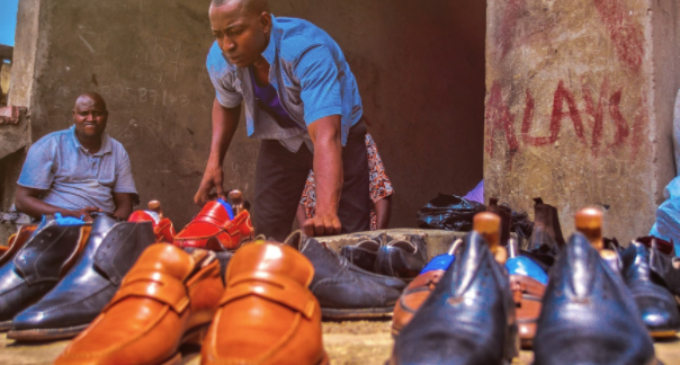The downside of the Igbo apprenticeship system

BY CHISOM JUANITA MEFOR
After the Biafra-Nigeria war saw an intensification amongst the Igbos trying to rebuild what they had lost in a bitter and devastating three years which claimed nearly half her population. Confronted with the challenge of starting life from scratch, it was during this time that Ndigbo saw a spike in the Igbo apprenticeship system (IAS) also known as Igba boi or Imu oluaka.
The Igbo apprenticeship system is an unpaid business apprenticeship/incubator model that lets young boys learn business methods from a master for a certain number of years (usually between five to eight years) and at the end of their apprenticeship tenure, gets cash infusion and support to start their own business. The structure works in a manner where an older “uncle” in trade teaches and establishes his younger kin in the said trade who in turn teaches other young folks.
The Biafra war may not have birthed the Igba boi system but it incontestably popularised it. The BBC in May 2017 referred to the IAS as “a Nigerian scheme forged in war that creates billionaires”. Lately, there’s been much ado for the Igba boi practice especially following its endorsement by Harvard as a college course equivalent to a BSc certificate and according to Forbes (2017), Anambra in southeast Nigeria either by good fortune or hard work has bred more naira billionaires than any other town in Nigeria.
I don’t mean to spoil the show but permit me to introduce to you my friend, Chiejina, whom I met through a mutual friend, Obiora (Obi for short).
Early years
As done in Igbo naming rituals, babies are named following the circumstances of their birth. After losing her father at the tender age of seven and later on her mom and husband as a young adult and burdened with the task of raising her little kids alone, Mama Chiejina settled with the name Chiejjinarum which loosely translates in most Igbo dialects to “Let the dark not come yet” or “Let the gloom not come yet”.
Chiejina may not exactly have been the “trophy child”, but he was a beautiful and bright boy and perhaps would’ve turned out better if guided properly and loved a bit more patiently. He was the kind of boy that everyone complained about; always too playful and never took his schooling seriously.
In the formative years of Chiejina’s life, he helped his mother sell bread and cabin biscuits at the popular Oyeagu market. After school hours, he would trek down about three miles to her stall, hopping in and out of traffic and in between lanes to sell bread to oncoming vehicles, it was in this way that he was noticed by a wealthy kinsman in his community (name withheld). “Chiejina na ba mbo”, his mother’s younger brother would say, further insinuating things like “he has an entrepreneurial spirit, allow him to stay with someone who will groom him properly for business”. How do you look at a nine-year-old who was simply trying to help his mother and say he has an “entrepreneurial spirit”?
Months passed, Chiejina was reduced merely to a menial servant, from washing piles of clothes to scrubbing the floors, doing the dishes, and tending the poultry. Here he was, thinking he had just got a better chance at life – a good school, good clothes but most importantly, some good food. Every morning while going about his home chores, little Chiejina would watch as his master’s children, Okwy and Omelebele, dressed for school in their white shirts and reddish-brown shorts, he imagined that someday he too would go to school and learn to speak properly like Okwy, without mixing his “was” and “were” up.
As years went on, Chiejina hoped, sometimes he despaired, but most of the times he cried, he cried to be around his mother once again, the same mother who had battered him badly for simple things like playing out late with friends or stealing bread from the carton when he was hungry. At least the devil he knew was way better than the master he did not know. Or, was he simply just an unlucky child? Was he the laziest boy on earth as his master often called him? Why was he so constantly torn between wanting to learn the trade and giving up on life at such a young age?
Mid-life
Life as an apprentice for Chiejina was purely about survival, early as 5am he would be up to wash his master’s car, after which he would set out about a mile to the shop to open it before 6am and display the wares. His first meal for each day depended solely on the first few sales commonly called in Igbo lingua Osoafia, a situation where one would run around and convince clients/customers to patronize their store, thereafter, the profit received is split between the shop owner and whoever brought the customer.
Chiejina was only certain of his dinner, although not too certain because his master’s wife could change her mind if he forgot to wash Okwy’s socks for school, even after a long day slaving at the shop, the warehouse, and at home, he would go to bed hungry and sobbing.
Whenever I think of Chiejina, I say a silent prayer for numerous young children trapped in people’s homes, subjected to all kinds of maltreatment, without access to rights and a voice. Yes, I know nothing good comes easy and the road to success is narrow and can only be plied with endurance but is this really the price it takes to be an Odogwu like Coscharis?
Closure/settlement
Ike agwu go mmoo
In my humble submission, I believe the Igbo apprenticeship system took more than it gave, for instance, it killed male-child education in the southeast, a skirmish which the former governor of Anambra state (southeast Nigeria), Willie Obiano fought painstakingly through mass sensitisation, mobilisation and went on even to initiate the annual celebration of an International Mass Literacy Day.
A publication of Tansian University (An African Journal of Arts and Humanities, July 2019) says: “The Igbo apprenticeship system has produced more millionaires and billionaires than the entire Nigerian university economic system has produced”. Neuwirth (2018) further observes that numerous Igbo multi-billionaires were the products of this business incubator platform: Innoson, Coscharis, Ibeto, Chikason, Ekenedilichukwu, are all from our great city of Nnewi in Anambra. None of these men ventured anywhere near the gates of a secondary school, some didn’t even finish primary school, but control multibillion-dollar empires”.
Education aside, we’re talking about thousands of boys taken away from their homes, without access to choices and parental care. Research shows that children that grow up with absent parents are more likely to be depressed as adults. I know a lot of billionaires like Ifeanyi Ubah, Cubana Chief Priest, Omemma na Ojoto are contemporary products and living testaments of the IAS, but what about young boys like Chiejina that got swallowed in the system due to the pressure placed in the Igbo society for everyone to succeed, you may mutter under your breath that Chiejina is just one person, but I tell you, that one person, is in fact, enough a reason to tell this story.
Perhaps we may need to distinguish between “help” and “exploitation”, why on earth did Chiejina spend 10 inglorious years at the hands of his master, even Ifeanyi Osilo spent less in pursuit of his medical degree in UNEC. A child who was terribly battered, maltreated, and basically used by an older man for his own profit and self-gratification.
At what point do we realise there are different paths to success? There is this needless pressure in Igbo society to be successful and over the years we have enabled and fueled this culture. This flimflam of wanting to “make it” and “be it”, is why an average Igbo person sees life as a struggle in which he must put all he has in order to live a successful life. If the Igbos are seen as working hard, competing, and being resilient, it is simply because of the excessive pressure placed by society on their eschatological destiny.
Settled by his master at age 24, Chiejina was still just a child, deserving of love, guidance, and patience rather than the undue pressure by his immediate family to take on the burden of sending his three younger siblings to school.
When I recounted the full story to a close friend, she asked me a question, in her usual gentle nature and that reassuring smile always full of hope, waiting on me to break the grass-to-grace story. “Well, what happened to Chiejina after”? she asked. “Nne m, chi e ji go, the dark eventually came, but I hope that wherever he is now, that he, Chiejina, finds peace, the kind of peace that we couldn’t give him on earth”.
Views expressed by contributors are strictly personal and not of TheCable.











There are no comments at the moment, do you want to add one?
Write a comment